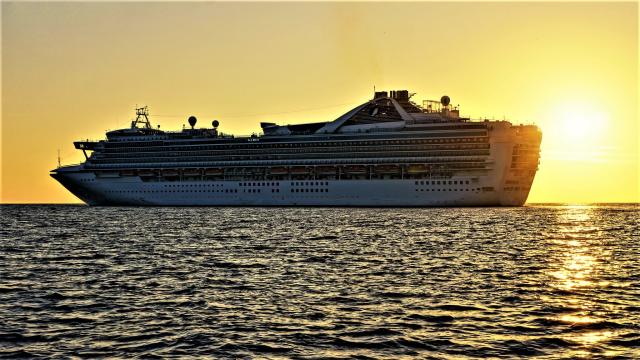Cruise ships are considered to be notorious hotbeds for illness, especially the “firing out both ends” kind. If you’d rather spend your trip soaking up sun and drinking Bahama Mamas than seeing your buffet dinner in reverse, follow these tips.
Photo by Damian Gadal.
[referenced url=”https://www.lifehacker.com.au/2017/07/stop-blaming-food-poisoning-on-the-last-thing-you-ate/” thumb=”https://i.kinja-img.com/gawker-media/image/upload/t_ku-large/nuleztlyyjatkrk0cuxn.jpg” title=”Stop Blaming Food Poisoning On The Last Thing You Ate” excerpt=”You’re on your hands and knees praying to the porcelain god, and between each of your wretched retches you curse the name of that restaurant you ate at a few hours earlier. But that place is probably not the culprit, even if you’re seeing that meal in reverse.”]
Despite the horror stories you hear about passengers being trapped on the SS Vomit, the odds are generally in your favour. Aimee Treffiletti, head of the CDC’s Vessel Sanitation Program (which inspects all cruise ships in US waters), explained to the Los Angeles Times that acute gastrointestinal illness (AGE) is pretty infrequent, and the chance you’ll get sick is declining. In fact, Treffiletti says less than 0.25 per cent of the 73 million cruise ship passengers between 2008 and 2014 suffered AGE, so there’s no need to fear.
[referenced url=”https://www.lifehacker.com.au/2011/06/am-i-washing-my-hands-correctly/” thumb=”https://cache.gawkerassets.com/assets/images/17/2011/06/handwashing3.jpg” title=”Am I Washing My Hands Correctly?” excerpt=”Much like wiping, washing our hands is something that all of us hopefully do, but don’t really discuss or share techniques for. But are we doing it the best way? Or doing it enough?”]
That said, sickness can still strike, and when it does, it will hit a cruise ship hard. Everyone is trapped in the same place, breathing the same air, touching the same surfaces, and eating the same meals. Here’s what you can do to avoid an epidemic, and avoid spreading it to others:
- Wash your hands often: This should be a no-brainer, but make sure you do it right. Do it after you use the bathroom, before eating, and any time after you’ve been touching things in common areas, such as railings or door handles.
- Carry around hand sanitiser: When you can’t wash your hands, hand sanitiser is the next best thing. Might even consider wiping down things in your cabin, such as doorknobs, remotes and phones.
- Do laundry and wear clean clothing: This is basic hygiene, but it can save you from getting sick too. Norovirus and other gut-wreckers can hang around on contaminated garments, so don’t push your luck.
- Get plenty of sleep: You’re going to encounter germs no matter what. Make sure your immune system is up for the fight.
- Drink a lot of bottled water: You need to stay hydrated to fight off bugs, but don’t trust the tap water or ice anywhere. This is especially true when you’re docked and wandering around another country’s port.
- Watch what you eat: Don’t eat food while you’re on shore in developing countries, only eat food that is cooked thoroughly and served hot, don’t consume unpasteurised items, and skip produce unless it has a removable skin.
- Don’t share utensils, food or drinks: Avoid self-serve foods if possible, but if not, use a napkin to hold tongs, spoons and ladles. Also, don’t take a bite or have a sip or someone else’s food or drink. If they’re infected, that’s it all it takes to spread disease.
- Use your own restroom: When possible, Joanne Chen at Condé Nast Traveller suggests you skip the public restrooms and use your own instead. There are still germs in your restroom, but they’re yours and not from several hundred other people on the ship.
- Be honest: If you start to show symptoms of any illness, let the ship’s medical team know so they can do whatever they can to prevent you spreading it. You might get quarantined, but you could save everyone else from suffering. If you’re feeling sick before you get on the boat, think about changing your plans.
The CDC suggests you make sure you and your family are up to date on routine vaccines before you leave as well. And check to see if where you’re going requires additional vaccinations. If you’re not sure where to start, sit down with your doctor and go over your trip itinerary. Of course, not all sickness is caused by a nasty germ. If the motion of the ocean is your problem, fear not, we have tips for that as well.
[referenced url=”https://www.lifehacker.com.au/2015/07/how-to-end-motion-sickness-before-it-starts/” thumb=”https://i.kinja-img.com/gawker-media/image/upload/t_ku-large/1332983673529013608.jpg” title=”How To End Motion Sickness Before It Starts” excerpt=”On our first family road trip, I was excited to play navigator. I’d look down at the map, look up to see where we were, back down at the map, then up again. I was doing a decent enough job until about five minutes in, when my upper lip began to sweat. My head and guts were swimming. I’ll spare you the details of how this story ends, but it’s not pretty.”]

Comments